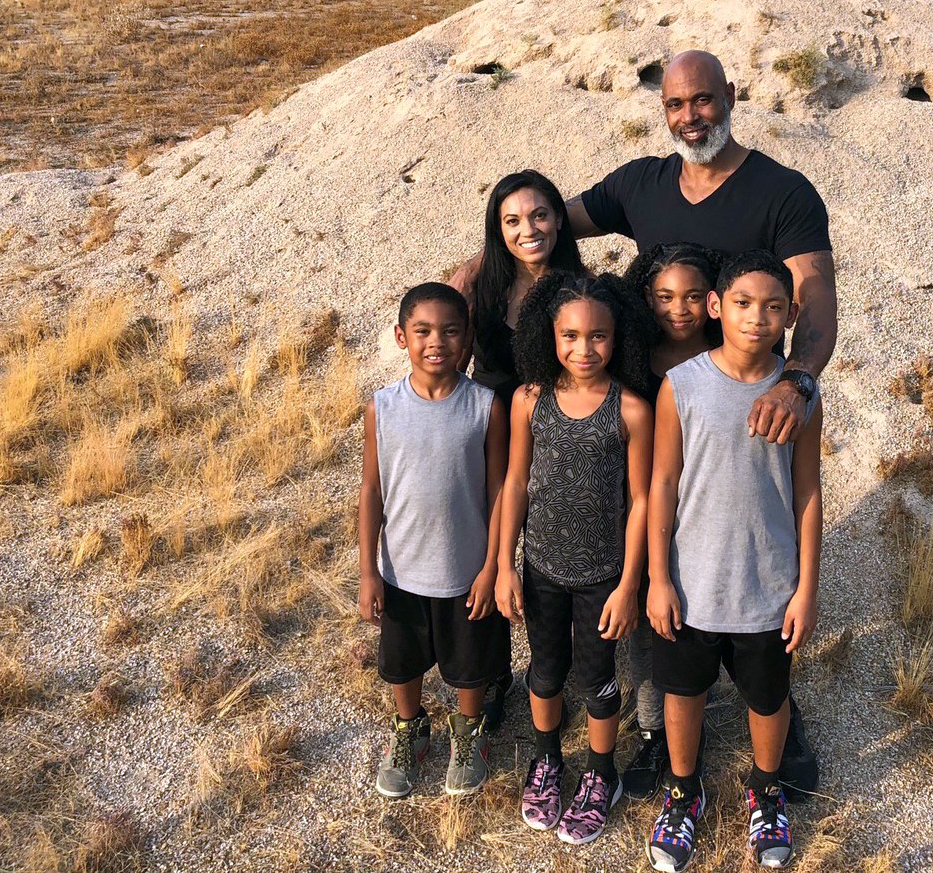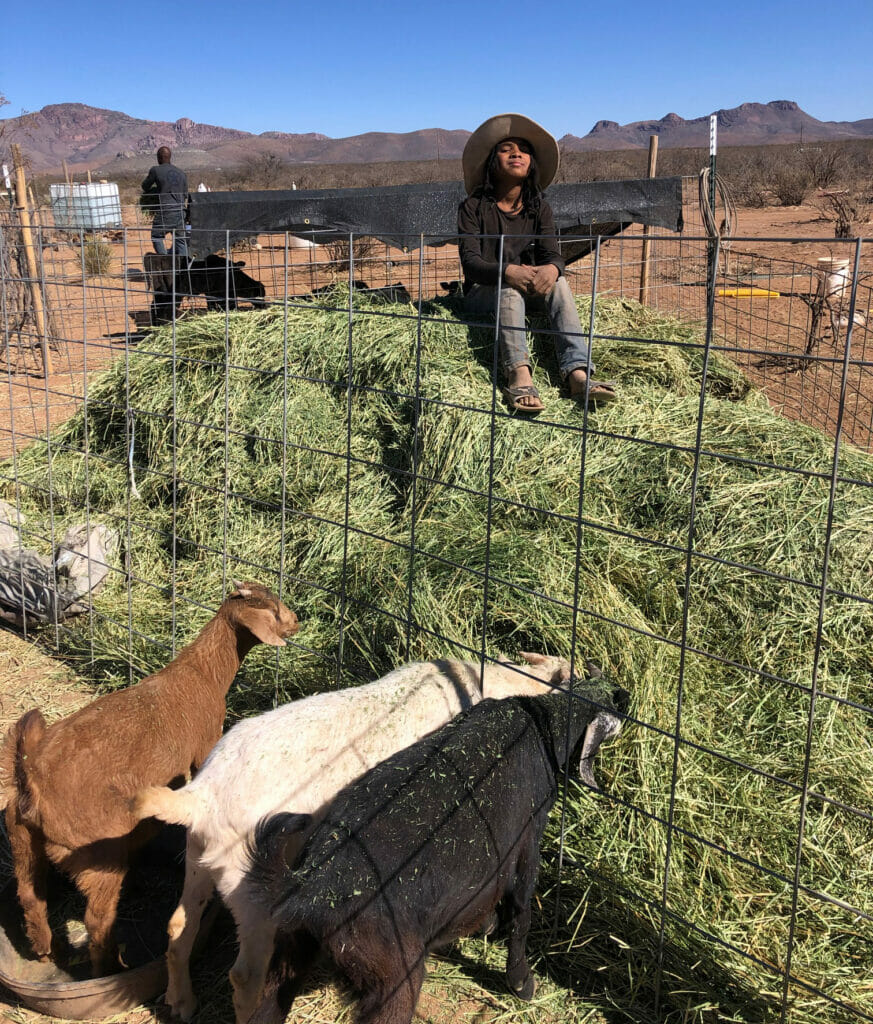A Burgeoning Network of Black Ranchers Grows in the Southwest
A Phoenix family swapped barbells for barnyard animals and is inspiring a community of Black farmers.
A Burgeoning Network of Black Ranchers Grows in the Southwest
A Phoenix family swapped barbells for barnyard animals and is inspiring a community of Black farmers.

Rachael and James Stewart moved their family to a farm they've dubbed The Protein Ranch.courtesy of James Stewart.
Just before the COVID-19 pandemic hit, personal trainers Rachael and James “Stew” Stewart were preparing to launch a fitness program and buy a house in Phoenix where their four children could play. Now, they’re tending goats on the Mexican border.
The pandemic triggered a triple threat for the Stewarts. First, gyms went into lockdown. Then, meat shortages cut off the staples of their paleo diet. Then, a real estate boom drove housing prices out of reach. It all combined to push the Stewarts to consider a dramatic change that would solve all three problems: They could buy inexpensive rural land and become commercial ranchers.
As a teenager, Rachael raised a pig through the 4-H program. But that was the totality of the Stewarts’ agricultural experience before they bought their land. Since Stew is Black, and Rachael is Filipina-Mexican, the couple searched for Black livestock farmers who might mentor them. And they were shocked to discover that there were none in the state.
They decided to become Arizona’s only Black-owned and operated commercial ranch, and in their change of career, they hope to become bellwethers of a burgeoning network of Black livestock farmers in the Southwest. “We want our children to grow up in a world where there are Black ranchers,” Rachael says. “So, Zwhen you don’t have an example, you have to be your own example.”
African-Americans have largely been pushed out of livestock farming due to the high cost of animals and discriminatory practices. But amidst the pandemic, job and food insecurity has motivated some to pursue self-sufficiency through agriculture.
Support networks for aspiring farmers of color are concentrated in the South and Northeast. But in the Southwest, the Stewarts had to get creative. Stew sold his classic 1972 Chevy Caprice to buy 10 acres of dust and scrub near Douglas, Arizona that they’ve dubbed The Protein Ranch. They called themselves the Southwest Black Ranchers and started a fundraising campaign to raise money for animals, equipment and feed. They’ve received messages of support through the campaign, but it’s also exposed them to abuse and derogatory comments by people telling them to pay for the ranch themselves.
Undeterred, they’re making the most of their bare-bones budget. Rachael is channeling her thrift shopping habit into searching for bargain livestock and second-hand chicken coops. She listens to an African radio station to get inspiration from farmers thriving on meager resources.
Instead of trying to break into the costly cattle industry, the family decided to fill in what they see as the gaps in the meat market. They’re acquiring goats and sheep to supply halal meat to Arizona’s large population of refugees and immigrants from Muslim nations. They also have ducks, chickens and heritage turkeys, and they plan to buy some guinea fowls and pheasants. “We specialize in the things you don’t get in the grocery store,” Stew says. “We want to go [directly] to people,.. and give people the freshest and most natural foods possible.”

They’re also shoveling into the hardened rock called caliche on their land to create underground greenhouses that will protect vegetables from dust storms and temperatures that swing from oven-like to freezer-ish. They stuff the dirt into mesh bags and stack them to construct what are called hyperadobe buildings, complete with roofs that harvest rainwater. Their first building is serving as their house, but it will eventually become a library where they’ll host nutrition, fitness and farming classes. Next up: a hyperadobe gym.
The Stewarts’ sons and daughters—aged eight to 11—are fully involved. They relish digging in the dirt and caring for the animals. “In reality, this is their ranch,” Stew says. Rachael adds, “They are the Southwest Black Ranchers.”
The Stewarts are forming a support network of Black farmers in the hope that they can become the mentors they didn’t have. They’re regularly connecting with about eight families of color who want to buy land and livestock,l or to purchase animals to raise on the Protein Ranch. Some are beginners who never imagined ranching could be a reality. One couple who had farmed in Phoenix recently moved next to the Stewarts’ ranch and purchased livestock for their own use.
“We want this to be a hub where people can grow and learn, and they don’t have to be ashamed. It’s OK to be scared of the turkeys,” Rachael says with a laugh. “Our goals are to help other people get into this, too, and to tell people that this doesn’t have to be impossible. It doesn’t have to be a dream.”
Follow us
This work is licensed under a Creative Commons Attribution-NoDerivatives 4.0 International License.
Want to republish a Modern Farmer story?
We are happy for Modern Farmer stories to be shared, and encourage you to republish our articles for your audience. When doing so, we ask that you follow these guidelines:
Please credit us and our writers
For the author byline, please use “Author Name, Modern Farmer.” At the top of our stories, if on the web, please include this text and link: “This story was originally published by Modern Farmer.”
Please make sure to include a link back to either our home page or the article URL.
At the bottom of the story, please include the following text:
“Modern Farmer is a nonprofit initiative dedicated to raising awareness and catalyzing action at the intersection of food, agriculture, and society. Read more at <link>Modern Farmer</link>.”
Use our widget
We’d like to be able to track our stories, so we ask that if you republish our content, you do so using our widget (located on the left hand side of the article). The HTML code has a built-in tracker that tells us the data and domain where the story was published, as well as view counts.
Check the image requirements
It’s your responsibility to confirm you're licensed to republish images in our articles. Some images, such as those from commercial providers, don't allow their images to be republished without permission or payment. Copyright terms are generally listed in the image caption and attribution. You are welcome to omit our images or substitute with your own. Charts and interactive graphics follow the same rules.
Don’t change too much. Or, ask us first.
Articles must be republished in their entirety. It’s okay to change references to time (“today” to “yesterday”) or location (“Iowa City, IA” to “here”). But please keep everything else the same.
If you feel strongly that a more material edit needs to be made, get in touch with us at [email protected]. We’re happy to discuss it with the original author, but we must have prior approval for changes before publication.
Special cases
Extracts. You may run the first few lines or paragraphs of the article and then say: “Read the full article at Modern Farmer” with a link back to the original article.
Quotes. You may quote authors provided you include a link back to the article URL.
Translations. These require writer approval. To inquire about translation of a Modern Farmer article, contact us at [email protected]
Signed consent / copyright release forms. These are not required, provided you are following these guidelines.
Print. Articles can be republished in print under these same rules, with the exception that you do not need to include the links.
Tag us
When sharing the story on social media, please tag us using the following: - Twitter (@ModFarm) - Facebook (@ModernFarmerMedia) - Instagram (@modfarm)
Use our content respectfully
Modern Farmer is a nonprofit and as such we share our content for free and in good faith in order to reach new audiences. Respectfully,
No selling ads against our stories. It’s okay to put our stories on pages with ads.
Don’t republish our material wholesale, or automatically; you need to select stories to be republished individually.
You have no rights to sell, license, syndicate, or otherwise represent yourself as the authorized owner of our material to any third parties. This means that you cannot actively publish or submit our work for syndication to third party platforms or apps like Apple News or Google News. We understand that publishers cannot fully control when certain third parties automatically summarize or crawl content from publishers’ own sites.
Keep in touch
We want to hear from you if you love Modern Farmer content, have a collaboration idea, or anything else to share. As a nonprofit outlet, we work in service of our community and are always open to comments, feedback, and ideas. Contact us at [email protected].by Keridwen Cornelius, Modern Farmer
April 3, 2021
Modern Farmer Weekly
Solutions Hub
Innovations, ideas and inspiration. Actionable solutions for a resilient food system.
ExploreExplore other topics
Share With Us
We want to hear from Modern Farmer readers who have thoughtful commentary, actionable solutions, or helpful ideas to share.
SubmitNecessary cookies are absolutely essential for the website to function properly. This category only includes cookies that ensures basic functionalities and security features of the website. These cookies do not store any personal information.
Any cookies that may not be particularly necessary for the website to function and are used specifically to collect user personal data via analytics, ads, other embedded contents are termed as non-necessary cookies.
Sounds like a great effort. I support black farmers, white farmers, all types of farmers. Trust they shall succeed.
I was raised in the Midwest and had gardens and worked the farms during the summer for money and then would help mom can our food for the winter. We were a large family. I swore I would never do that again. But as I have watched how unhealthy the foods we are sold I have changed my mind. I have gone back to healthy eating. I can and my mom who still teaches us gives us advise and her know how. I would be a regular visitor and know others that would as well. I have been following the… Read more »
This is absolutely amazing! I am hoping one day my family and I can follow in your footsteps!